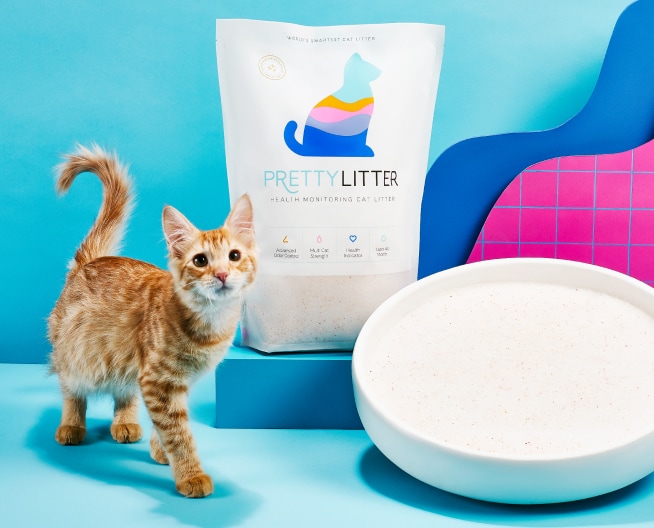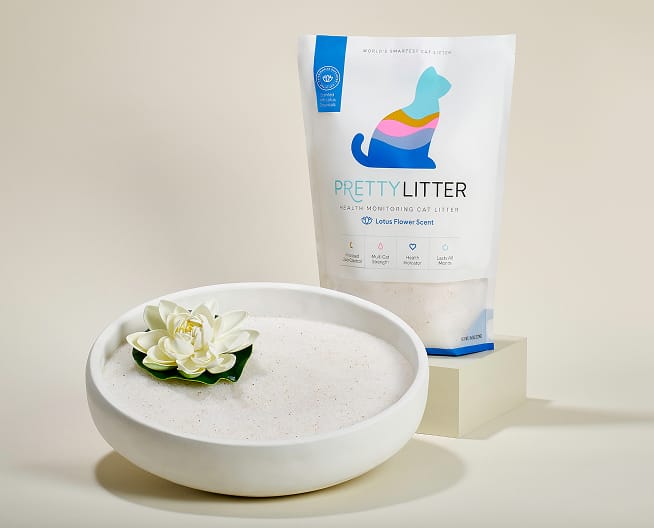June 15, 2022 |12 min read
Why Does My Cat’s Poop Smell So Bad? 7 Causes and Solutions

Written by

Updated Dec 1, 2025
Cats are such lifesavers. Sometimes all you need is a little guy to follow you around and sit on your lap (or keyboard) the first chance they get – or ignore you all day until it's time to eat if yours is like mine. That is why we, cat owners, should always be alert for any signs that something might be up with our furry friends. One such sign you should keep an eye on is the smell of their poop.
What does healthy cat poop smell like?
For a healthy cat, the smell of poop should be mild and barely noticeable. Stool can be described as earthy or musky, without anything overpowering or unpleasant. But if it's smelly enough to ask yourself, "Why does my cat's poop smell so bad?" something is up. As a pet parent, it can be quite unsettling when our pets are showing unusual signs. Monitoring your cat’s litter box and the smell of your cat's poop is important, as any significant changes may indicate potential health concerns.
If you suddenly notice streaks of blood on your cat’s stool with a strong odor, treat that as an emergency and call your vet right away.
Here is what the bad smell could mean and what action you should take.
#1 Diet
Just like us, cats are sensitive to certain foods or specific ingredients found in some foods. For instance, your cat might be sensitive to foods with high vitamin content or grains. Some cat foods also contain lots of fillers, making them hard to digest, which could lead to smelly cat poop and gassy, foul-smelling stool.
Cats are natural hunters, and when you aren't looking, they can hunt and eat bugs, rodents, and small reptiles, just to mention a few. Even though they are carnivores, these protein-rich foods could cause a bad odor in their stool.
Is Diet Causing Your Cat's Smelly Poop?
Your cat's foul-smelling stool is caused by diet if:
You Have Recently Introduced a New Food Into Their Diet
The solution is to remove it from your pet’s diet and feed them cat food without grains and excess vitamins, or go for higher-quality cat food. Also, if you have introduced the food suddenly, you can solve it by switching it slowly. Start giving it in small portions and gradually increase them for, say, ten days so your cat’s digestive system can adjust.
You Have Reason to Think They Were Out Hunting
If they don't eat as much as usual, come home with bloodstains, or you notice any other sign of eating out in the wild before the smelly poo, the only solution is to wait it out and keep monitoring the litter box for changes in stool or diarrhea.
#2 Bacteria
Cats have a naturally high prey drive and will often hunt rodents, birds, and other small animals to eat, especially if they spend time outdoors.
Normally, this wouldn't be a problem, and it is easy to dismiss it by saying, "But my cat has been hunting and eating them for years and has never had a problem. But the problem is not about eating the prey; it is about what the prey is carrying.
If they eat unhealthful prey, for example, one that is infected with Salmonella or E.coli bacteria, it could manifest as very foul-smelling feces and even blood in stool.
Is Bacterial Infection Causing Your Cat's Smelly Poop?
If your cat has been infected with bacteria, chances are you have seen other signs. If you hadn't, or they hadn't manifested yet, you should be on the lookout for the following signs and symptoms, such as vomiting, diarrhea, or lethargy.
If your feline friend has some of these signs, then you need to immediately have them checked out by a veterinarian. Advanced cases of bacterial infection are life-threatening for any pet.
#3 Parasites
Intestinal parasites are a common cause of smelly stool in cats of all ages, from kittens to adults. An intestinal parasite can be caught in several ways, but kittens mostly get them from their mother, and adults get them from other infected cats, fleas, or from hunting and eating infected rodents.
Worm eggs, once inside the cat, move to the intestines and start hatching and reproducing. If left untreated, they can be fatal. The most common parasites in cats are Giardia, Coccidia, and Trichomonas, and they all cause foul-smelling cat feces.
Is Parasitic Infection Causing Your Cat's Smelly Poop?
It can be difficult to be sure your cat has been infected by parasites before the signs show, and they usually take between five and sixteen days. But once the smelly stool starts, you can tell they have been infected by parasites, as it is accompanied by:
- Weight loss despite normal or increased food intake.
- Anorexia.
- Poor hair coat.
- Alopecia (hair loss)
- Scratching of the ears.
- Dirty ears.
- Red, irritated skin.
- Itchy, scratchy skin.
- Occasional diarrhea or mucus-covered stool
To help them get better, consult a veterinarian who will treat your feline friend with antibiotics, among other interventions. Treatment takes anywhere from two weeks to be effective.
#4 Medications and Supplements
Some cat medications and vitamin supplements may alter normal gut bacteria or disrupt your cat's natural chemical balance by affecting the hormones. For instance, antibiotics are known to alter digestive bacteria and the intestinal microbiome. For the period the cat is using the medication, it could have foul-smelling poop.
Is Medication Causing Your Cat's Smelly Poop?
If your cat is under medication, and the smelly poop problems started right around the time they went under that medication, it is most likely the culprit. The same goes for supplements: if the smell started around the time you started supplementing vitamins, it is most likely the reason.
Although it doesn't necessarily show that something is wrong, if you believe the medication is causing the smelly feces, don't ignore it, thinking, "It'll pass. It's for his/her good."
You can't be sure the medication isn't causing any more damage apart from making the poo smelly. Unless your vet explicitly implied that it could cause smelly poo, it would be best to consult them. They may solve it by swapping the medication with another that isn't so problematic, or instructing you on what to do.
If you are giving them supplements, you should stop immediately. Most high-quality cat foods have well-balanced diets, so you don't have to supplement anything without veterinary guidance.
#5 Anal Gland Infections
Cats and dogs have anal glands on the sides of the inside of the anus, which are full of strong-smelling liquid. If they become infected, the liquid could take on a very strong foul smell, making the cat poop very smelly. There are a variety of reasons that can lead to anal gland infections. For example, if they become clogged and develop an abscess, you will notice traces of blood and pus on the smelly poop or your cat's rear.
Is Anal Gland Infection Causing Your Cat's Smelly Poop?
Every time a cat with an anal gland infection poops, they are in pain, so this is not something you should sit on. You should immediately seek out a vet if you notice the following signs:
- Scooting or dragging the anal area along the ground.
- Excessive licking under the tail.
- A swollen area on either side of the anus.
- Bloody or sticky discharges on either side of the anus.
Your vet will open and drain the abscess in the glands, flush and clean out the infected area, and may place a drain to allow drainage from the wound until it heals.
#6 Digestive Disorders
Even without specific allergies or food intolerances, some cats have very sensitive stomachs. Sensitivity can lead to diarrhea or very sticky poop in your cat’s litter box.
Apart from sensitivity, some medical conditions, like mal-digestion and mal-absorption, can cause your cat to have issues digesting food or absorbing nutrients. These issues can develop over time or attack your cat due to age. If their digestive system cannot absorb starches or fats, it can result in rancid-smelling poop and ongoing intestinal upset.
Is Digestive Disorder Causing Your Cat's Smelly Poop?
You can tell that your cat has digestive disorders if, apart from smelly poop, they have the following signs: vomiting, weight loss, flatulence, or chronic diarrhea.
If your cat has any of the above signs, it is time for a trip to the vet's office. They will run tests to identify the actual cause of the disorder in the digestive and intestinal tract. If they believe it is being caused by a sensitive stomach, ask them to recommend the best foods for your furry friend. If they find any other cause, they will address it accordingly.
#7 Litter Choice
Sometimes smelly poo doesn't mean that something is up with your cat. It could be pointing to problems with their toilet. There are several types of litter, such as clumping and non-clumping litter, and some are better at absorbing the smell than others. If you are sure it's empty and not yet time to change your litter, the only reason may be its quality.
Is Poor Litter Choice Causing Your Cat's Smelly Poop?
If the litter your cat uses wasn't specifically labeled as unscented or odor-controlling, consider switching to a different litter brand. If it was, you can test its quality by buying a higher-quality litter and testing it out on your friend. Consider non-clumping vs clumping cat litter, and any other variables that would impact when to change cat litter. If the foul odor reduces or stops, the quality of the litter is the problem.
However, before you make changes to the litter or try at-home methods like baking soda, dish soap, or vinegar, it would be best to resort to this as your last option. It takes time to test and could effectively mask the smell instead of treating its underlying cause.

A Smarter Solution for Odor and Health Monitoring
Smelly cat poo could mean several things. Some of them are mild and don't have any effect on your cat, such as a poor cat litter choice, while some are serious and can be fatal, or at the very least uncomfortable, such as anal gland infections.
Learn more about how to choose cat litter, or speak to your veterinarian about different types of cat litter that are best for your cat’s needs.
To avoid the poop smell and still be able to detect any signs of illness, it would be best if you invested in a health-monitoring litter, such as PrettyLitter. This silica cat litter traps odors and instantly eliminates moisture.
But the best part about PrettyLitter is that it changes color to tell you when your cat has a potential health issue, so you can get them help before it becomes an urgent medical situation. It will save you money in hefty medical bills and save your cat's life. So why not consider PrettyLitter–the best cat litter for smelly stool and overall peace of mind?
Sources:
- Pet MD.What Should My Cat's Poop Look Like?https://www.petmd.com/cat/general-health/what-should-my-cats-poop-look-like
- Meowtel.What Your Cat's Poop is Telling You.https://meowtel.com/blog/post/what-your-cats-poop-is-telling-you
- Pet Perrenials.Why Does My Cat's Poop Smell So Bad? Causes And Remedies.https://petperennials.com/blogs/news/cat-sympathy-cards









